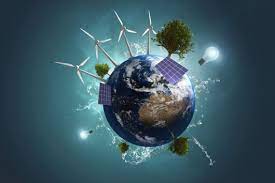
According to the CEO of the World Energy Council, Angela Wilkinson, the global energy system is no longer "fit for purpose," and she made reference to the slow progress being made towards a planned switch to green energy.
“The most recent pulse from April shows that the world energy system is no longer fit for purpose,” Wilkinson told CNBC’s “Squawk Box Asia” Wednesday, in reference to the findings from her organization’s Energy Pulse reports which offer snapshots of trends across the energy ecosystem.
According to the council's most recent assessment, by 2050, just about half of the world's energy system will be electrified, which would be a setback for many governments' net-zero commitments.
“The concern from most energy leaders is [that] the pace of change is too slow to keep us on track for the Paris Agreement,” she continued. The report cited 64% of global energy leaders sharing their concerns.
In the 2015 Paris Climate Agreement, governments from around the world committed to keeping global warming far below 2 degrees Celsius and pursuing measures to keep it below 1.5 degrees Celsius.
Stresses on energy capabilities and security that existed even before the coronavirus epidemic, according to Wilkinson, may be the cause of the projected energy transition's delayed progress.
Following the Covid-19 outbreak, a number of setbacks, including Russia's invasion of Ukraine, Europe's resolve to wean itself from Russian hydrocarbons, and an impending global recession, have had an influence on the world energy markets. Which has forced the global system and the energy markets to walk a narrow line.
“We are trying to grow [and] build a double size energy system to meet demand, [and] at the same time, decarbonize the energy system faster than ever before,” Wilkinson told CNBC.
A range of toolkits aiming at reorienting energy mix away from fossil fuels towards zero or low-emission energy sources have served as the foundation for the anticipated trip to net zero. Adopting carbon taxes, which charge greenhouse gas emitters a fee per tonne of carbon they produce, is one strategy.
According to data from the International Monetary Fund from a year ago, 46 countries are putting a price on pollution through carbon taxes or other emissions trading schemes.
“A global carbon tax would just be impossible to administer,” Wilkinson said. “There’s no such thing as a true market price of energy, or a true market price of carbon, because you’ve got subsidies, you’ve got regulations, you’ve got very uneven economies and playing fields.”
The tax's price signalling mechanism for both investors and consumers, she continued, is what gives it its significance. The signal is crucial because societies must bear a cost associated with carbon.
(Source:www.cnbc.com)
“The most recent pulse from April shows that the world energy system is no longer fit for purpose,” Wilkinson told CNBC’s “Squawk Box Asia” Wednesday, in reference to the findings from her organization’s Energy Pulse reports which offer snapshots of trends across the energy ecosystem.
According to the council's most recent assessment, by 2050, just about half of the world's energy system will be electrified, which would be a setback for many governments' net-zero commitments.
“The concern from most energy leaders is [that] the pace of change is too slow to keep us on track for the Paris Agreement,” she continued. The report cited 64% of global energy leaders sharing their concerns.
In the 2015 Paris Climate Agreement, governments from around the world committed to keeping global warming far below 2 degrees Celsius and pursuing measures to keep it below 1.5 degrees Celsius.
Stresses on energy capabilities and security that existed even before the coronavirus epidemic, according to Wilkinson, may be the cause of the projected energy transition's delayed progress.
Following the Covid-19 outbreak, a number of setbacks, including Russia's invasion of Ukraine, Europe's resolve to wean itself from Russian hydrocarbons, and an impending global recession, have had an influence on the world energy markets. Which has forced the global system and the energy markets to walk a narrow line.
“We are trying to grow [and] build a double size energy system to meet demand, [and] at the same time, decarbonize the energy system faster than ever before,” Wilkinson told CNBC.
A range of toolkits aiming at reorienting energy mix away from fossil fuels towards zero or low-emission energy sources have served as the foundation for the anticipated trip to net zero. Adopting carbon taxes, which charge greenhouse gas emitters a fee per tonne of carbon they produce, is one strategy.
According to data from the International Monetary Fund from a year ago, 46 countries are putting a price on pollution through carbon taxes or other emissions trading schemes.
“A global carbon tax would just be impossible to administer,” Wilkinson said. “There’s no such thing as a true market price of energy, or a true market price of carbon, because you’ve got subsidies, you’ve got regulations, you’ve got very uneven economies and playing fields.”
The tax's price signalling mechanism for both investors and consumers, she continued, is what gives it its significance. The signal is crucial because societies must bear a cost associated with carbon.
(Source:www.cnbc.com)





